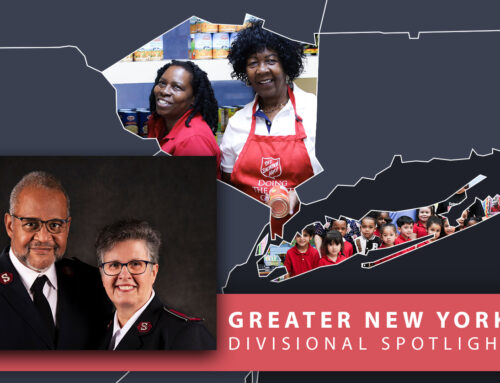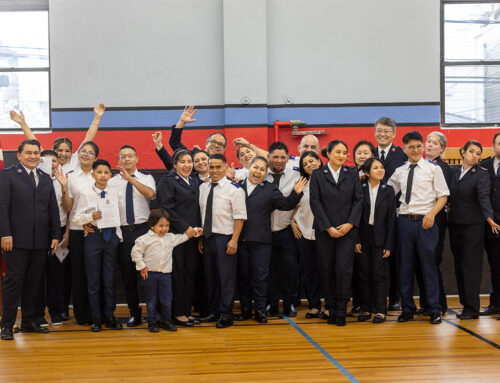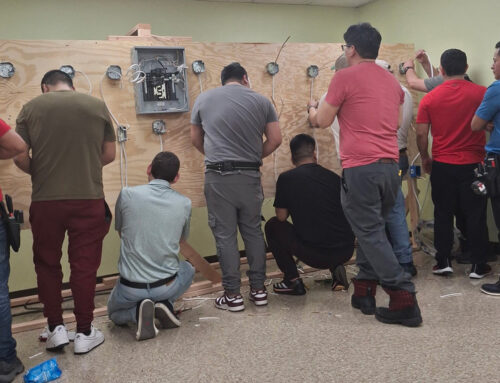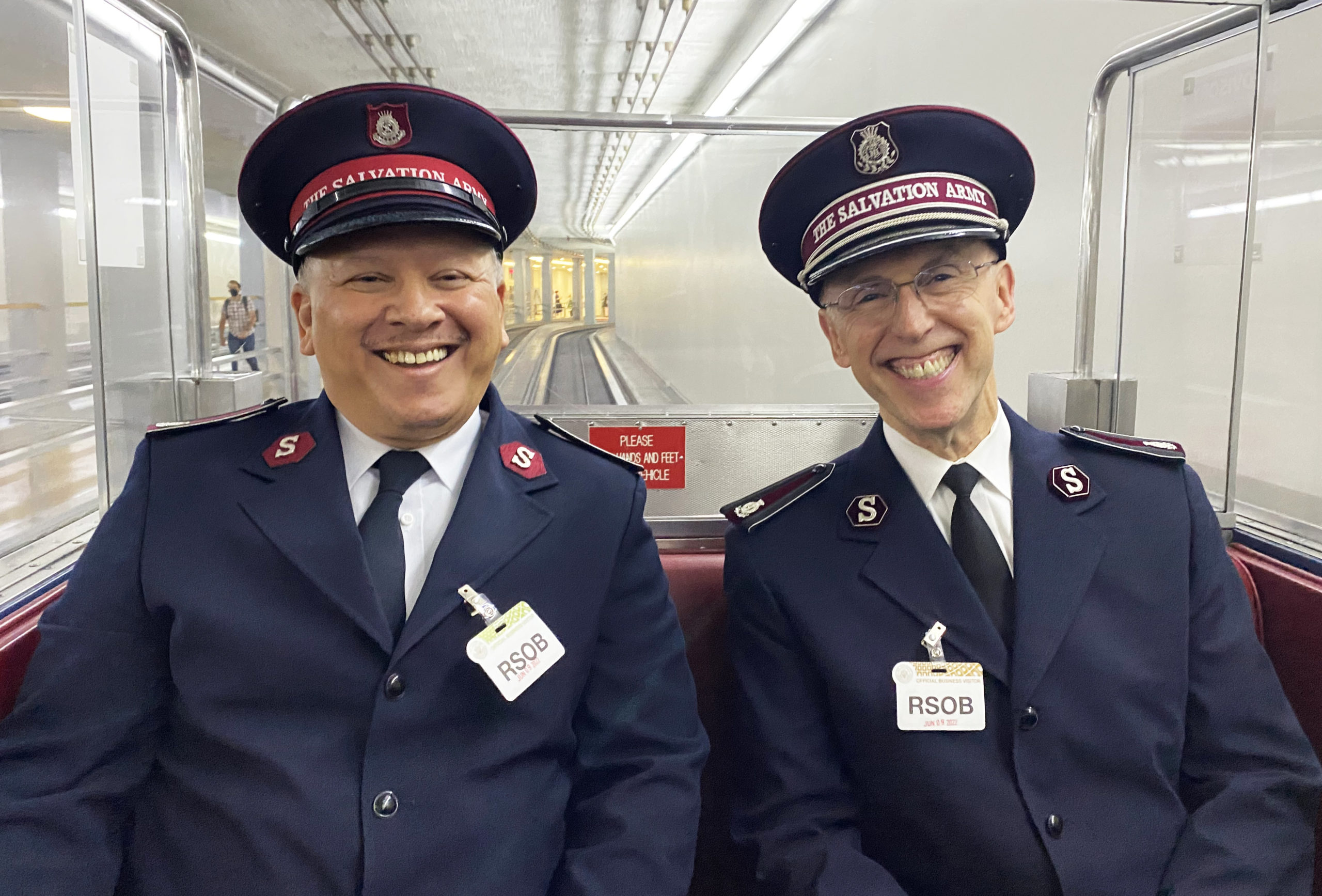
A voice on The Hill
Lt. Colonel Davis goes to Washington
by Warren L. Maye
Lt. Colonel David B. Davis has an infectious smile and a kind demeanor that’s easy to embrace. Those admirable qualities are great assets in his new appointment. In February of 2021, he became the Salvation Army’s National Social Services & Public Policy Liaison and Special Representative to Capitol Hill in Washington DC. His office at National Headquarters (NHQ) is in nearby Alexandria, Va.
“It’s the most specific outreach to government officials that I’ve had since I became a Salvation Army officer,” says the former divisional commander in Massachusetts. Prior to that appointment, Davis served at the College for Officer Training in Suffern, N.Y., as Director of Personnel and then Assistant Principal. He was also the divisional youth secretary, and divisional secretary in the PENDEL Division, and a corps officer in the Greater New York Division. He also served as a single officer in several appointments in the USA Southern Territory.
Today, Davis pursues a mission that embraces the entire United States. “My function is to connect The Salvation Army on the national level with members of Congress and various federal and government agencies. I primarily arrange meetings for our national leaders with members of the House of Representatives and the Senate, accompany them to those meetings, and conduct follow up meetings when needed. I also engage with government agencies to share the Army’s scope of service throughout the nation.
“It can be a daunting task to arrange meetings with the members of Congress. As you can imagine, they are incredibly busy with schedules that are quite dynamic and there are protocols that must be followed as I seek the help of their staff members. But by meeting with the congressional members, we’re able to build relationships and share stories of how the Army is serving people in their states and districts.
“Many are surprised to hear that we are the largest non-governmental social service provider in the United States. We share that we provide services in every zip code through approximately 7,600 locations throughout the nation. In times of tragedy and for everyday needs we are there, we always have boots on the ground. In most cases, we are the first to arrive on the scene, the last to leave, and our support of communities in need is constant.”
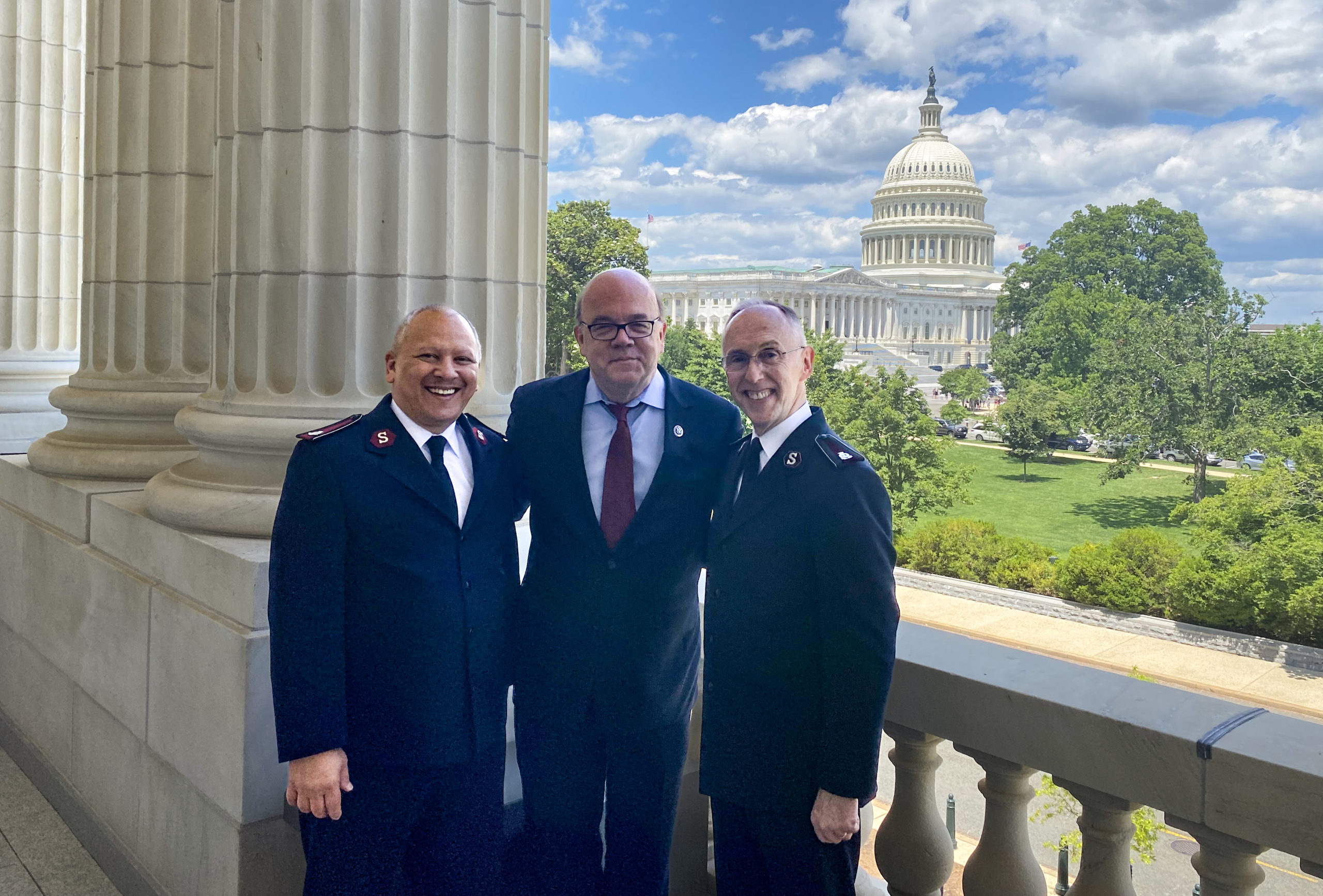
Left to Right: Lt Colonel David Davis, Congressman James McGovern, Commissioner Kenneth Hodder
Telling the Army’s story
Davis says that since July 2020 the national leaders, NHQ Public Policy staff, and representatives from the territories have held over 100 meetings with congressional leaders and staff. Telling the Army’s story on Capitol Hill opens their eyes to the possibilities for collaboration and positions the Army as a reputable advocate for people who are poor and disadvantaged.
“For the most part, they don’t have a full understanding of what we are all about,” says Davis. “Most of the leaders we’ve met are not aware of the full scope of the Army’s services. Some only know us as bell ringers at Christmas and those who serve during disasters and who help people conquer addictions through adult rehabilitation programs. When they hear about all that we do, many are pleasantly surprised and are eager to learn more about our ministries.
“So, we’re able to really educate the members of Congress. Many times, in setting up the meetings, they assume we are going to ask for money. But in our meetings, the national commander simply wants to make them aware of the Army’s vast array of services and to let them know that we are available to come alongside them to alleviate poverty in their states or districts.”
The public policy team covers the areas of housing, vulnerable populations, and basic needs. They work together with the public relations firm, LERMA and assist in providing briefings for each of the Capitol Hill meetings.
“They also research the members to be visited as well as the legislation relating to Salvation Army programming. We plan strategy and discuss talking points, to be well prepared for each meeting,” says Davis.
“We can have up to 3–5 meetings per day, each about 20 minutes long,” says Davis. “Schedules can change quickly because many of the leaders must be ready if they are called to vote. I’m finding it interesting to have these in-person meetings because I get to see a totally different side of them than as they appear in the media. It’s also good for them to know that the Army is nonpartisan. We welcome conversations with all, regardless of whether they are Democrat or Republican.”
Prior to 2020 and the COVID-19, pandemic, NHQ’s public policy team hosted territorial delegations for monthly meetings on the Hill. In these meetings representatives from the territories describe their services and advocate for the needs of the people in their regions. In-person visits are still prohibited for the most part, but the meetings have begun again virtually.
Serving all the people
“These meetings help our Congressional leaders know that we are busy serving the people every day of the year,” says Davis. “So, the question we always pose is, ‘How can we better help you serve people in your district or state?’ Every leader has a passion and a cause, so we encourage them to check with the local Salvation Army units in their states to see how we can all work together to help others.”
Although Davis has served in the USA Eastern Territory, he is quite familiar with the District of Columbia, formally known as the National Capital Division, but is now called the Potomac Division, which is a combination of Washington DC, Virginia, West Virginia, and Maryland. Born in New Orleans, La., Davis met the Army through the scouting program. He was commissioned in 1983 in the Southern Territory as a single officer. He met his wife, Lt. Colonel Margaret Wiltshire Davis, in Washington, DC. They married in 1986.
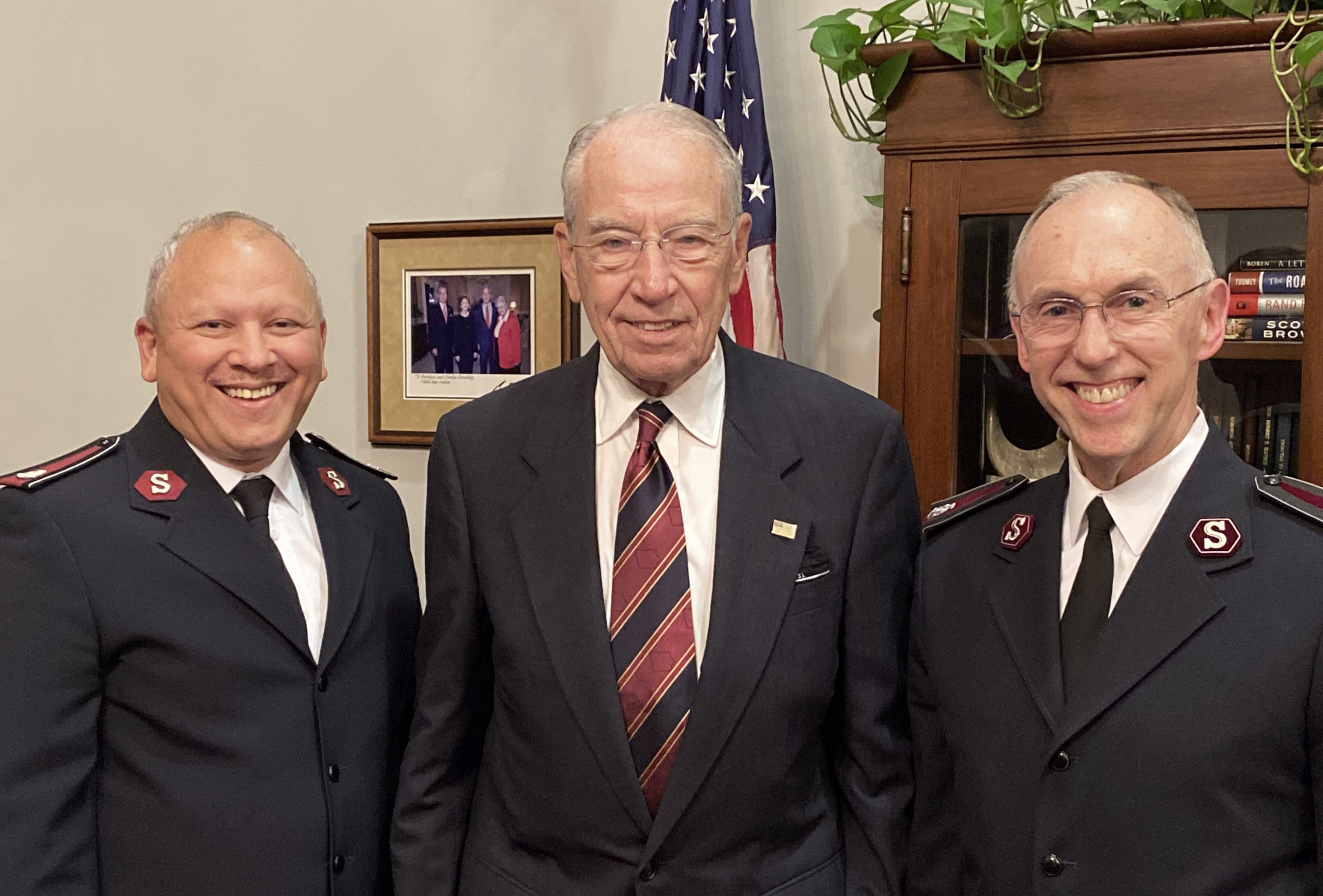
Left to Right: Lt Colonel David Davis, Senator Charles Grassley, Commissioner Kenneth Hodder
Boots on the ground
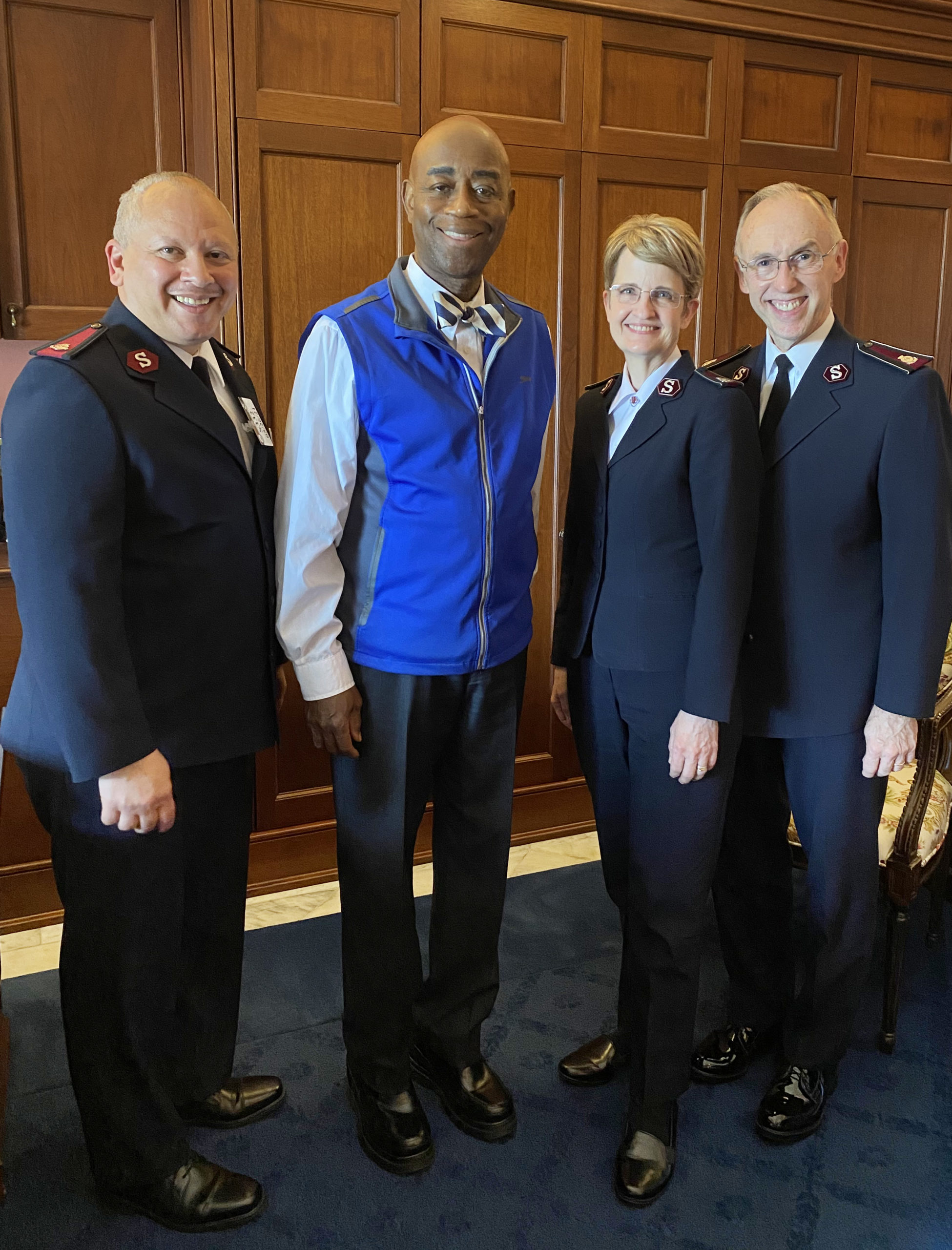
Left to Right: Lt Colonel David Davis, US Senate Chaplain Barry Black, Commissioner Jolene Hodder, Commissioner Kenneth Hodder
Davis says the Army uses several programs designed to encourage members of Congress to roll up their sleeves and engage in local ministry. One such program is “The Grate Patrol,” which provides food, blankets, and other supplies to homeless people in the DC area via a mobile canteen. “We invite congressional leaders to come out with us on a night of their choosing,” says Davis. “The Grate Patrol operates 24/7, 365. We want them to see and to serve.”
The Patrol has been a moving experience for those who are able to participate. “Back in the 1980’s when I first went to Washington, DC, homelessness was a huge issue in this country,” Davis recalls. “It is still a big problem today.
“We also encourage territorial and divisional leaders to engage congressional leaders on the local level. This furthers the conversation and provides real opportunities for collaboration in service to those in need,” says Davis. “Although in past years, national commanders have reached out to members of Congress, our approach has increased significantly with the current national commander. His goal is to visit with each member of Congress to share the Army’s work across the nation.
“The expression, ‘when you don’t have a seat at the table, you won’t have access to the resources’ comes to mind when we miss opportunities to engage in these important ways.” Says Davis. “The Salvation Army’s collaboration with members of Congress and other U.S. government agencies such as The Center for Faith-Based & Neighborhood Partnerships helps us meet social service requests from across the nation. We have collaborated on the COVID-19 Task Force, the Afghan Resettlement Program, and the crisis in Ukraine. This helps them to know that The Salvation Army is meeting human need in every way we can. We’re there. We have our boots on the ground.”

